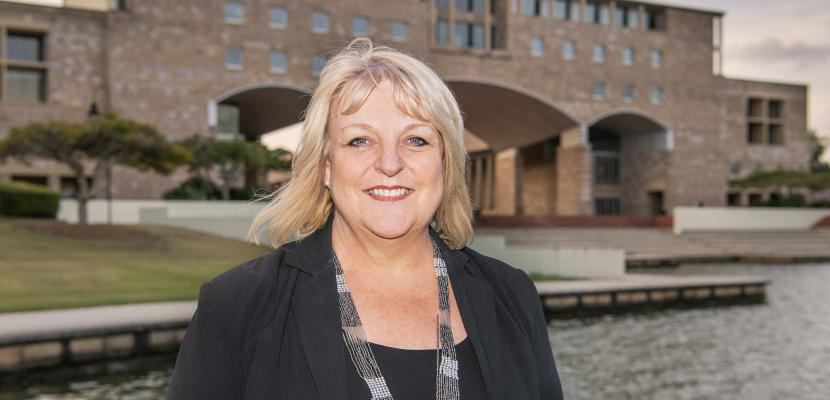
Freedom Hub's founder and chief executive, Sally Irwin, recently spoke at Bond University as a guest of student-run 180 Degrees Consulting.
In a quiet Palm Beach café, as customers sipped on coffees and scanned the menu, a woman walked to the counter and handed a 10-page letter to the barista.
The words tumbled from her mouth – “please help me, please help me, please give this to someone.”
The letter, outlining years of sustained and horrific abuse, was immediately sent to Sally Irwin, founder and chief executive of The Freedom Hub, which channels all profits from its Palm Beach café and a sister café in Sydney towards running survivor schools, designed to help victims of modern day slavery re-integrate into daily life.
Speaking at Bond University recently as a guest of student-run 180 Degrees Consulting, Irwin recalls the moment she read the woman’s terrible tale of abuse.
“It was probably one of the worst cases I’ve ever read. It came to me, and I flew up the next day. Her skull had been fractured so many times she was epileptic, she was forced to service not only (her captor), but he was selling her to friends so he could keep his alcohol problem going, and she was anorexic, living on scraps he’d let her eat. She had one piece of clothing, so when he went to visit friends, she’d run to the Salvation Army bin and get some clothes.”
The European woman was university-educated, but had no identification – no passport, no driver’s licence.
She had been kept prisoner for 15 years, and had been failed by the system, trying five times to get assistance from different services on the Gold Coast. Without identifying documents, none of them could help her.
Irwin describes modern day slavery as a term encompassing all areas of slavery, including sex slavery, sexual servitude, organ harvesting, human trafficking and debt bondage.
It can include domestic employees being forced to work more than 20 hours a day, migrant workers on farms picking fruit or in textile factories making garments for minimum wage, or women and girls sold into the sex trafficking business.
The story of slavery in the modern era is writ large on the walls of The Freedom Hub’s Palm Beach café – there’s profiles of women the organisation has helped, each being rescued from a different form of entrapment.
The International Labour Organisation estimates there are 40.3 million people in the world in slavery. According to the 2018 Global Slavery Index, 15,000 of these are in Australia.
Irwin began The Freedom Hub in March 2014, opening a café in Sydney, followed by the Palm Beach café 18 months ago. She deliberately set up the Gold Coast business ahead of the Commonwealth Games, as sex trafficking triples in most cities that host the four-yearly sports event.
The Freedom Hub has survivor schools operating in both New South Wales and Queensland, supporting survivors of modern-day slavery to re-teach themselves about safety and freedom of choice.
“You’ve actually got to start by teaching them to think for themselves and make decisions, knowing they won’t get into trouble,” Irwin says.
Survivors are also taught about Australian culture and history, as well as basic life skills – how to use a computer, how to go to the bank and the post office, how to use public transport. When they’re deemed to be work-ready, they’re helped with not only administration skills but lessons on cultural norms, and how to read body language.
When someone is rescued from slavery, they’re referred to Red Cross, which receives government funding to support them. They’re provided with an appropriate visa, and registered for Centrelink and Medicare.
Red Cross refers survivors to The Freedom Hub, as does the Salvation Army and domestic violence centres. Child brides get referred by youth services, and sometimes school counsellors.
Bond University Associate Professor Dr Danielle Ireland-Piper, an expert in transnational crime and international law, said while Australia had lower rates of modern day slavery than many countries, it was still a significant issue.
“Modern slavery is exploitative and has terrible consequences on a person’s human rights, ranging from a fundamental violation of the inherent dignity of the person, to gender equality, children’s rights, labour rights, and rights to freedom from violence, sexual exploitation, and abuse.
“While a 2018 report included Australia among countries with the lowest levels of slavery, that doesn’t mean it’s not still an issue or that supply chains for goods purchased and sold in Australia aren’t connected with modern slavery elsewhere.”
Several weeks ago, the woman from the Palm Beach café flew back to Europe. With the help of The Freedom Hub and other organisations, her case has been referred to the United Nations, and she is now undergoing treatment at rehabilitation facilities in her home country.
For Irwin, it’s that sort of outcome that makes her efforts worthwhile.
“I call them ghosts, and these are the people I built The Freedom Hub for, the people that slip through the government system, the people that are hidden in houses and in bedrooms, and in slavery where nobody knows they exist, they have no identity.”